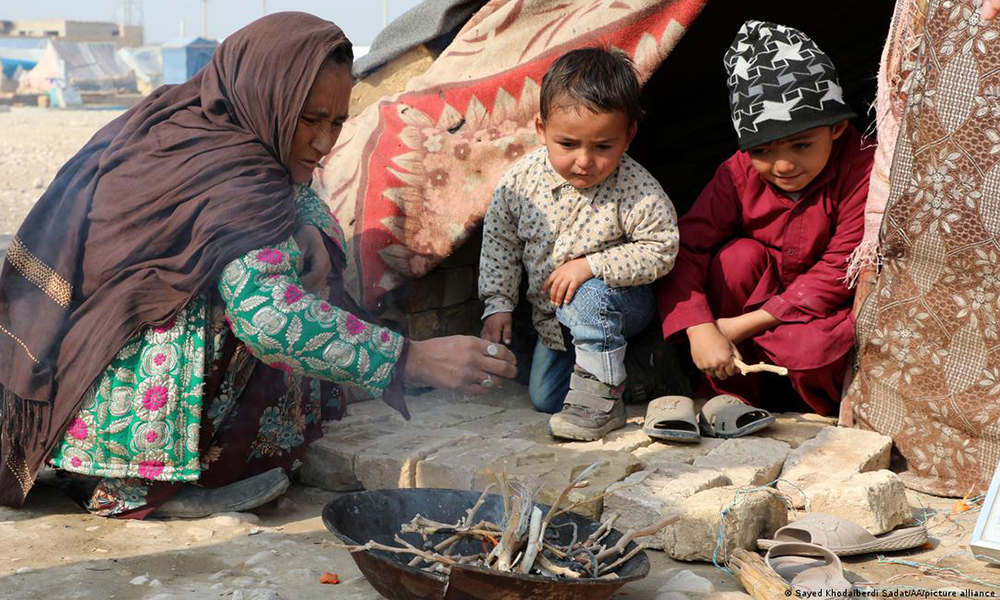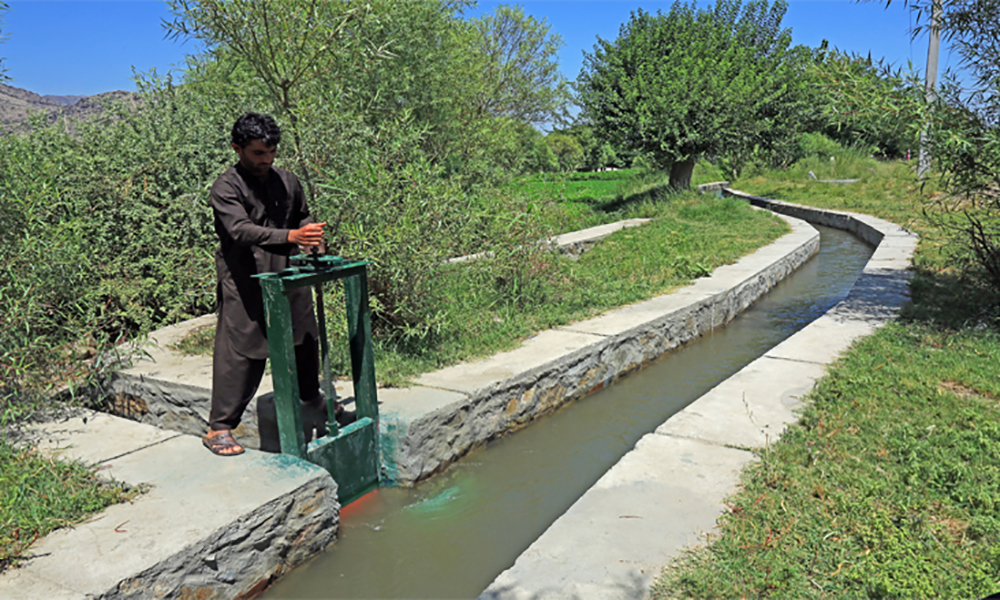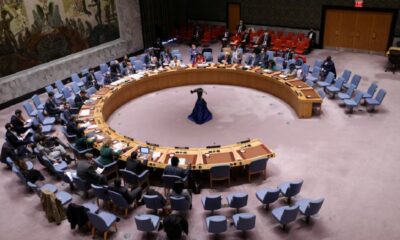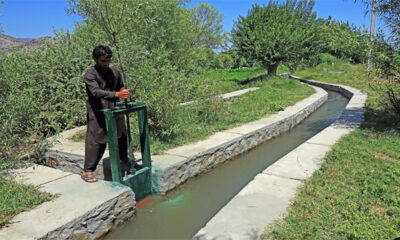Latest News
CIA scrambles for new approach in Afghanistan: NYT reports

As US troops withdraw from Afghanistan, the CIA is reportedly under intense pressure to find new ways to gather intelligence and carry out counterterrorism strikes in the country, the New York Times reported Monday.
But, according to the report, the spy agency has few good options.
The CIA, has been at the heart of the 20-year American presence in Afghanistan, will soon lose bases in the country from where it has run combat missions and drone strikes while closely monitoring the Taliban and other groups such as al-Qaeda and the Islamic State (Daesh).
However, the agency’s analysts are warning of the ever-growing risks of a Taliban takeover, the Times reported.
United States officials are in last-minute efforts to secure bases close to Afghanistan for future operations with one focus on Pakistan.
According to the Times, the CIA used a base there for years to launch drone strikes against militants in the country’s western mountains, but was kicked out of the facility in 2011, when US relations with Pakistan soured.
The Times reported that diplomats are also exploring the option of regaining access to bases in former Soviet republics that were used for the Afghanistan war, although they expect that Russia’s President Vladimir Putin would fiercely oppose this.
As the search continues, recent CIA and military intelligence reports on Afghanistan have been increasingly pessimistic, the Times reported.
Intel reports have highlighted gains by the Taliban and other militant groups in the south and east, and warned that Kabul could fall to the Taliban within years and return to becoming a safe haven for militants.
The Times reported that the scramble for bases illustrates how US officials still lack a long-term plan to address security in a country where they have spent trillions of dollars and lost more than 2,400 troops over nearly two decades.
William J. Burns, the CIA director, has acknowledged the challenge the agency faces. “When the time comes for the US military to withdraw, the US government’s ability to collect and act on threats will diminish,” he told senators in April.
Burns meanwhile visited Islamabad last month to meet with the chief of the Pakistani military and the head of the directorate of Inter-Services Intelligence, the country’s military intelligence agency.
In addition to this, Defense Secretary Lloyd J. Austin has had frequent calls with the Pakistani military chief about getting the country’s help for future US operations in Afghanistan, the Times reported.
But according to the report, Burns did not bring up the base issue during his trip to Pakistan, and the visit focused on broader counterterrorism cooperation between the two countries.
However, the Times reported that at least some of Austin’s discussions have been more direct.
Douglas London, a former head of CIA. counterterrorism operations for Afghanistan and Pakistan, told the Times that the agency was likely to rely on a “stay behind” network of informants in Afghanistan who would collect intelligence on the Taliban, al-Qaeda, the stability of the central government and other topics. But without a large CIA presence in the country, he said, vetting the intelligence would be a challenge.
In the short term, the Pentagon is using an aircraft carrier to launch fighter planes in Afghanistan to support the troop withdrawal. But the carrier presence is unlikely to be a long-term solution, and military officials said it would probably redeploy not long after the last US forces leave, the Times reported.
The United States is also stationing MQ-9 Reaper drones in the Persian Gulf region, aircraft that can be used by both the Pentagon and the CIA for intelligence collection and strikes.
But, according to the Times, some officials are wary of these so-called over the horizon options that would require plane and drones to fly as many as nine hours each way for a mission in Afghanistan, which would make the operations more expensive because they require more drones and fuel, and also riskier because reinforcements needed for commando raids could not arrive swiftly during a crisis.
The Times also stated that as Pakistan is a longtime patron of the Taliban, Islamabad is unlikely to sign off on any US strikes against the Taliban that are launched from a base in Pakistan.
The Times also stated that while some American officials believe Pakistan wants to allow US access to a base as long as it can control how it is used, public opinion in the country has been strongly against any renewed presence by the United States.
This comes after Pakistan’s foreign minister, Shah Mehmood Qureshi, said last month that the government would not allow the US military to return to the country’s air bases.
The Times reported that American diplomats have been exploring options to restore access to bases in Central Asia, including sites in Kyrgyzstan and Uzbekistan but that any negotiations with those countries are likely to take considerable time to work out.
According to the Times, US military and intelligence analysts are now in broad agreement that the Afghan government is likely to have trouble holding on to power.
They believe the Afghan security forces have been depleted by high casualty rates in recent years and that the announcement of the US withdrawal is a psychological blow that could weaken the force.
In addition, the Times reported that some current and former officials are skeptical that remote advising or combat operations will succeed.
Latest News
2023 marred by ‘tremendous challenges’ for Afghanistan

Last year, 2023, was a year of “tremendous challenges” for the people of Afghanistan, but it was also a year marked by resilience and determination, the Deputy Special Representative of the Secretary-General, Resident and Humanitarian Coordinator, Indrika Ratwatte, said in the UN’s annual report on Afghanistan that was published this week.
Ratwatte said: “In the face of adversity and multiple concurrent shocks, the people of Afghanistan have demonstrated remarkable courage and strength.”
Afghans now mention access to food as their most pressing need, he said adding that “unable to pay for or produce basic sustenance, millions face hunger and malnutrition.”
In 2024, an estimated 15.8 million people will experience crisis and emergency levels of food insecurity.
The majority of the population is unable to procure basic needs such as healthcare, food, livelihoods, and housing, the report stated.
The UN found that the country also remains vulnerable to climate change.
Following the worst drought in three decades, emerging El Niño conditions now threaten a new cycle of flooding and crop pests. In this context, lifesaving humanitarian aid has been crucial in preventing the collapse of the social fabric. It has also served to underpin the stability of the economy. Despite growing humanitarian needs, relevant funding cuts have forced humanitarian actors to prioritize the most vulnerable further, the report stated.
A Gallup poll found that 95 percent of the population consider themselves to be suffering. In addition to living in poverty, the average life expectancy in Afghanistan has been falling for the past five years.
The Herat earthquakes and unprecedented large-scale returns of refugees from neighbouring countries, including Pakistan and Iran, have shown the disruptive impact of recurrent shocks and underscored the need for sustained international engagement and support, the UN stated.
“As we embark on the next chapter, in 2024, it is imperative that we remain steadfast in our commitment to the principles of human rights, gender equality, and women’s Empowerment,” Ratwatte said.
“We will continue to include women as key partners in our work, to provide assistance ‘by women, for women’, and to tirelessly work for equal access to education in line with the demands we hear from Afghans in all areas of the country,” he said.
However, from an economic point of view, Afghanistan’s economy appears to be stabilizing at a low equilibrium level following a period of significant contraction since 2021.
The UN said in the report that growth barriers include severely restricted operations in the banking sector (including microfinance institutions), trade disruptions, and institutional issues hindering service delivery, including in the private sector.
“The sudden cessation of a significant amount of international aid and grants, which had accounted for 40 percent of the country’s Gross Domestic Product (GDP), along with a freeze on international reserves amounting to about US$9 billion and the imposition of international sanctions, caused a severe balance of payments, banking and payment systems crisis.
“Notably, financial restrictions have removed liquidity from the banking system,” the report stated.
Despite the crisis and a period of devaluation towards the end of the year, the AFN is 20 percent stronger than it was in 2021 due to currency export controls, UN cash shipments of US dollars into Afghanistan, and personalremittances.
Imports continued to surpass exports through 2023 and increased as the economy contracted.
“This appears to be a paradox: the currency appreciated while the trade deficit widened, suggesting that there might be other unidentified sources of financing besides US dollar cash shipments and remittances to support the account deficits,” the report read.
The UN also said that with its partners, it will work to initiate a dialogue with the Islamic Emirate on adjustments to regulatory frameworks and sustained public service delivery with the aim of creating a long-term and sustainable pathway to reduce aid dependency and put Afghanistan back on a path towards development
“In this regard, we reiterate our offer to the DFA for a dialogue and will work jointly with international partners, donors, and Afghans on how such engagement can be structured in a most productive way.”
Latest News
Beijing hosts Afghan delegation for talks on a wide range of issues

The third meeting of the China-Afghanistan working-level liaison mechanism on humanitarian assistance and economic reconstruction was held in Beijing this week where in-depth talks were held on numerous issues relating to Afghanistan.
Liu Jinson, Director of the Asian Department of China’s Ministry of Foreign Affairs, and Jalali, Director of the Third Political Department of the Ministry of Foreign Affairs of Afghanistan, co-chaired the Beijing meeting.
Also in attendance were representatives from various Chinese commissions, government departments, international aid organizations, as well as the Afghan Ministry of Commerce and Industry, the Ministry of Mines and Petroleum, the Ministry of Disaster Management, and the Ministry of Refugee Affairs.
Quoting an Afghan proverb, Liu said at the meeting that “friends come and go, but neighbors always remain.”
He pointed out that since 2021, China has implemented a diplomatic concept of amity, sincerity, mutual benefit and inclusiveness that was proposed by President Xi Jinping in terms of Beijing’s dealings with Afghanistan.
China has also adhered to a friendly policy towards all Afghan people, and adhered to the principle of respect for the country’s independence, sovereignty and territorial integrity.
He also said that during the different regimes in Afghanistan, China has always provided support and assistance for Afghanistan’s peaceful reconstruction and economic development.
The Afghan delegation meanwhile stated that the Islamic Emirate attaches great importance to developing relations with China, and thanked China for taking the lead in sending a new ambassador to Afghanistan and accepting the appointment of an ambassador to China.
The Islamic Emirate said Afghanistan is willing to deepen friendly relations with China, maintain traditional friendship, and will, as always, support China in safeguarding its core interests and achieving national reunification.
The two sides agreed in the meeting that Afghanistan is currently facing multiple challenges such as floods, droughts, and refugee resettlement, among other issues.
They also noted that the freezing of Afghanistan’s foreign assets by the United States has “aggravated the suffering of the Afghan people.”
The IEA stated however that it was “very grateful to China for its humanitarian assistance over the years and hopes to continue to receive help from China in refugee resettlement, disaster prevention and mitigation, improvement of medical and health conditions, and treatment of children with congenital heart disease.”
On the Belt and Road initiative, the IEA delegation said Afghanistan is deeply satisfied with the progress in practical cooperation between the two countries. They also said Afghanistan is willing to learn from China’s experience in modernization and development, and hopes that China will help Afghanistan cultivate more professional talents.
China meanwhile urged the international community to step up humanitarian assistance to Afghanistan, and said Beijing hopes the IEA will “actively respond to some of the international community’s reasonable concerns about Afghanistan’s inclusive governance.”
Liu in turn acknowledged the IEA’s efforts to promote economic reconstruction and said bilateral trade volume between China and Afghanistan reached US$1.33 billion last year, a record high and a year-on-year increase of 125.4%.
The Islamic Emirate meanwhile said in posts on X that the issue of investment opportunities in Afghanistan was widely discussed and both sides welcomed moves to pave the way for the export of pomegranates.
“Also, both sides talked about the latest developments in increasing the level of oil extraction in Afghanistan and starting the extraction of Logar’s Mes Aynak mine and it was emphasized that plans should be considered to speed things up,” the IEA stated.
“The Afghan side welcomed the capacity building training programs of civil servants in many ministries and agencies of the Afghan government with the support of China. In addition, the Chinese side promised to expand the range of scholarships to Afghan students according to the needs of Afghanistan,” the IEA stated.
Latest News
UN builds 470km of water canals in Afghanistan in past year

The United Nations has built 470 kilometers of much needed water canals in Afghanistan in the past year in cooperation with local communities, the World Food Program (WFP) confirmed.
WFP in Afghanistan said in a post on X, formerly Twitter, on Wednesday that the canals were built in order to provide access to water to more people across the country.
The agency said the people “in Afghanistan cannot continue their lives without access to water,” adding that the canals help farmers irrigate crops, which allows them to feed their families and sell surplus produce.
This comes after years of drought across the country. However, in the past few months, good rain has been recorded which will hopefully result in good harvests this year.
-

 Sport5 days ago
Sport5 days agoACL draw to be broadcast live on ATN channels
-

 Regional5 days ago
Regional5 days agoIRGC chief warns of harsher response if Israel attacks Iran
-

 Sport4 days ago
Sport4 days agoACL fever grows as fixtures finalized
-

 Latest News5 days ago
Latest News5 days agoContact group on Afghanistan hits roadblock over Pakistan’s gripe with India
-

 Sport5 days ago
Sport5 days agoHetmyer powers Rajasthan win in low-scoring IPL thriller
-

 World5 days ago
World5 days agoUN Security Council to meet Sunday on Iran attack
-

 World4 days ago
World4 days agoUS will not take part in any Israeli retaliatory action against Iran
-

 Latest News4 days ago
Latest News4 days agoOver 50 people dead in traffic accidents over Eid
























